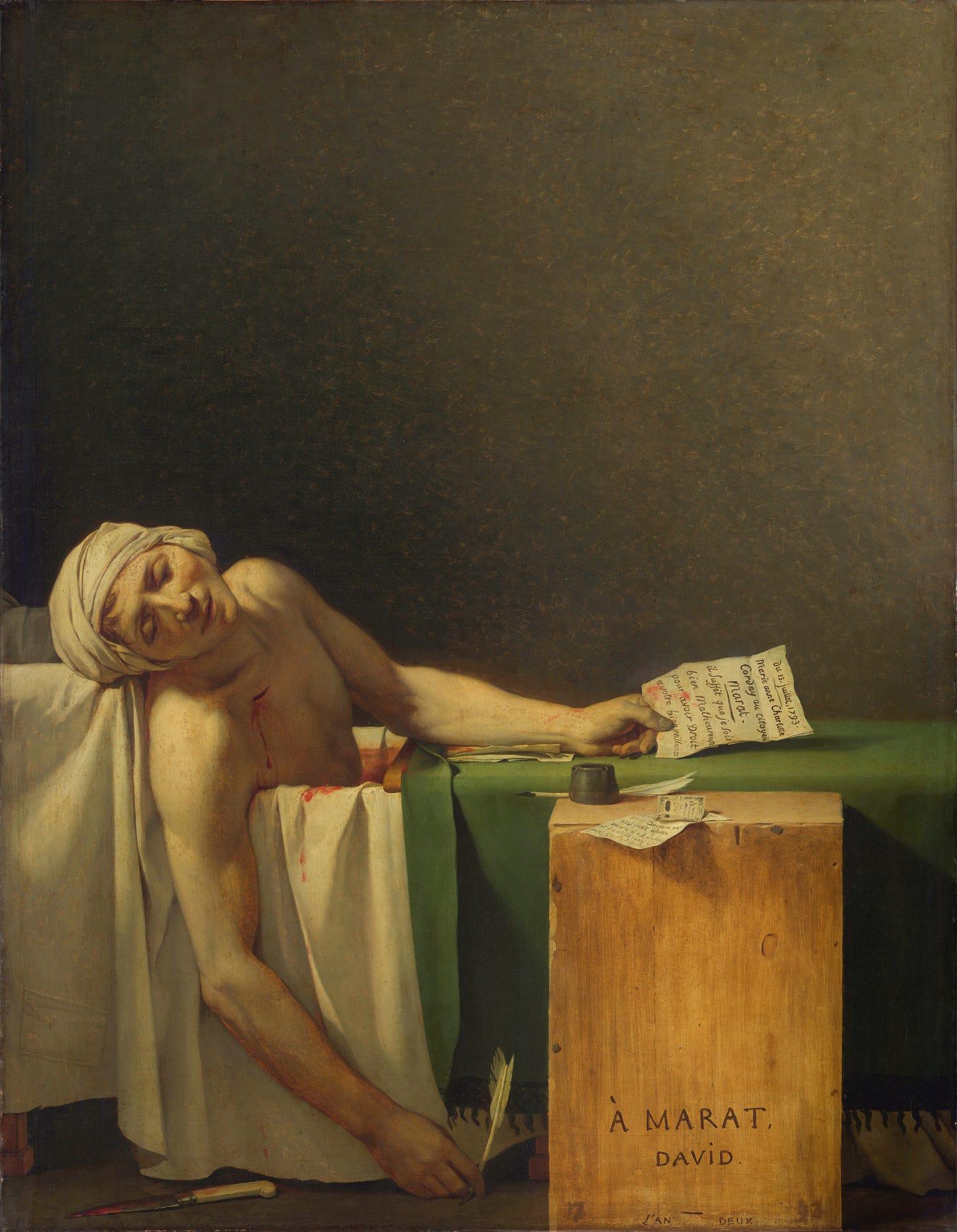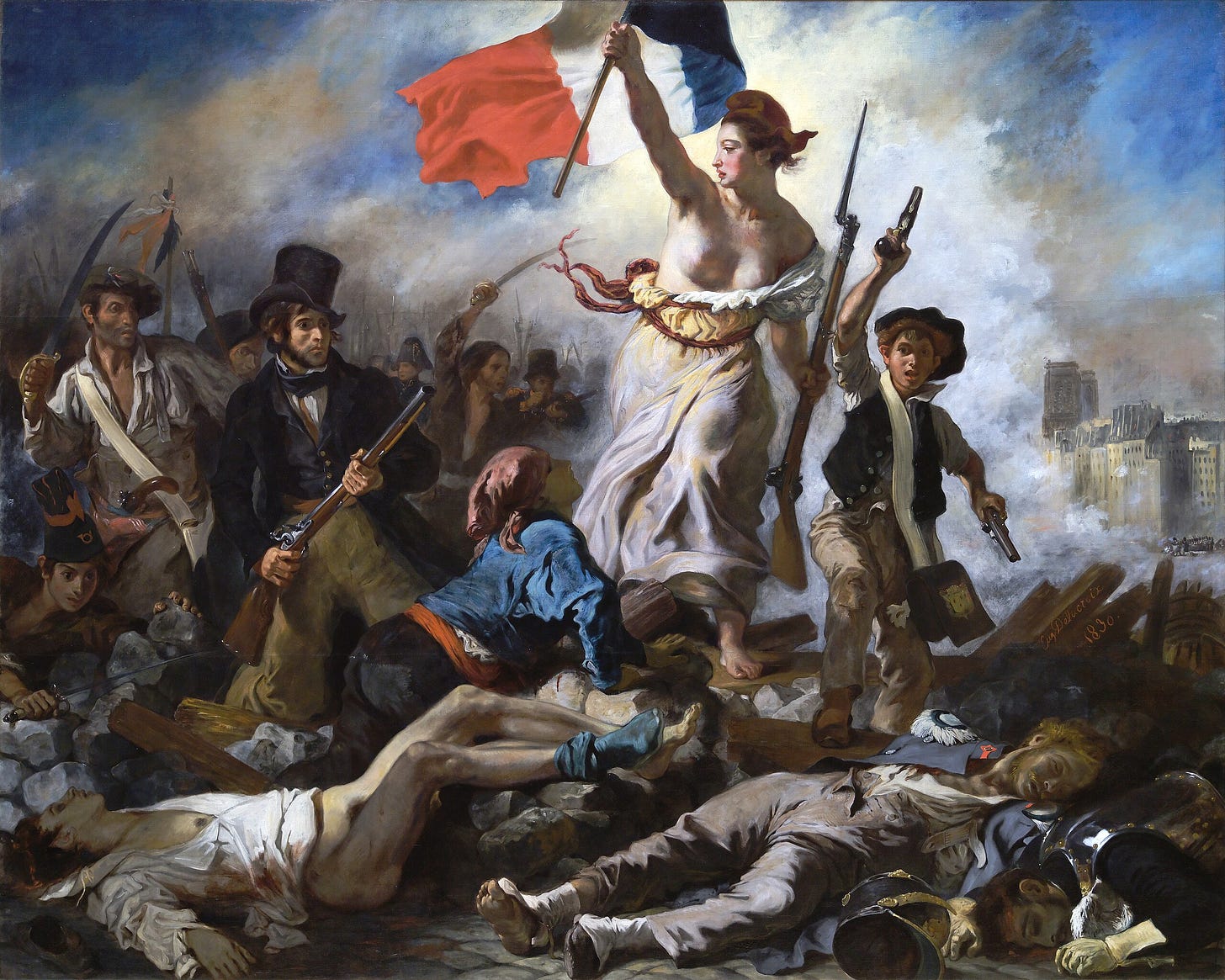第五章:法国大革命开启了什么
原书及其作者:法国大革命,起于捍卫人权、推翻君主专制,却通向了恐怖统治和军事独裁。这个过程值得警醒。
系列上一篇:What it ended | 结束
-----
Chp5 What it started
1.Totalitarian democracy
>p83 The Revolution began as an assertion of national sovereignty. Nations—not kings, not hereditary elites, not churches—were the supreme source of authority in human affairs. It was this conviction which led the National Assembly in 1790 to declare that France would never make war except in self-defence …… a new principle of political legitimacy had been irrevocably launched, and within 100 years of the apparent triumph of reaction in 1815, the sovereignty of nations had achieved acceptance throughout Europe and the Americas.
“国家主权(national sovereignty)”的概念,从此成为了几乎不再受到质疑的现代政治底层原则之一。不再是王侯将相即是国家,国家自此被认可为一种合法性来源于全体国民的独立政治实体。
但究竟是什么构成了“国家(nations)”?抽象的“全体国民”概念可比贵族或王室难以捉摸多了,这就像抽象的全民所有制总是很容易变成管理者所有制——权贵所有制。独立的“国家主权”作为一个概念是出现了,但是该拿这个概念怎么办?是通过意识形态或政治高压来操纵民意,还是少部分自封的先进革命者有权不惜一切代价去帮人们实现“真正的”幸福,还是如何确立一种投票和代议的复杂系统来尽可能的把握合法性来源… 落实概念比提出概念要更复杂,这就不是一本书所能囊括的了。
2.Liberalism
>p84-85 But what the Spanish liberals dreamed of was based on the political model first established in France by the Constituent Assembly: representative government underpinned by a written constitution guaranteeing a basic range of human rights. These would constitute the minimum demands of political reformers throughout the 19th century and down to the overthrow of the last absolute monarchy in Russia in 1917. The essence of liberal beliefs was to be found in the Declaration of the Rights of Man and the Citizen. That meant freedom to vote; freedom of thought, belief, and expression; and freedom from arbitrary imposition or imprisonment. Liberals believed in the equality embodied in the Declaration, which meant equality before the law, equality of rights, and equality of opportunity. They did not, however, believe in equality of property, and one of the main functions of the rule of law which they consistently invoked was to secure property owners in their absolute rights.
比“国家主权”还复杂的另一个概念,“自由主义(Liberalism)”也经由法国大革命而成其大观。自由主义的基本实现模板是以成文宪法为基础的代议制政府,它的基础信念来自于对人权的信仰和仰赖。
但是现在问题来了,人权的边界到底划到哪里?自由的群氓真的是足以信任的吗?比方说,财产应该像共产社会那样彻底平均,还是保护私有产权;如果政治权利包括所有人的话,那是否也包括女性参政议政的权利(这段话的历史背景是19世纪初);如果人人生而平等,那么奴隶贸易该怎么办?如果所有人都该有平等的一张选票,这是否会领向民粹、民族主义、暴力、愚昧,和自我毁灭;也许有的人并不知道自己“真正”想要的是什么,那么应该放任他们行使自己的自由还是该由一个什么权威来代替他们做出选择?
自由主义这个词不再给人戴上不可质疑的镣铐,但是随之而来的就是,总有些规则是需要的,那你们现在要如何自我划定规则的边界和自由的边界——然后承担其后果?这一问还会引出更麻烦的问题,自由的担子有时候是很重的,那么不想承担这种重量而希望回到不自由中去——自由的社会中存在让人选择不自由的自由吗?这种“选择不自由的自由”又会对整个社会的自由主义理念造成什么影响?
这一小节的笔记从第三点开始就已经超出原书的讨论范围了,但是能超出这么远也侧面说明了法国大革命所播下的理念已经成为了现代社会多么牢固的思考框架。从法国大革命至今,时间已经过去几百年了,世界大战已经打过两场了,上面一点在我心里还能接着延伸,那就是自由主义社会培养出的人们能否延续诞生了他们的自由主义环境?如果对不宽容者的宽容势必会影响到同一个世界里的其他自由,那么从小在自由平等理念下长大的现代人是否还能理解在现代社会中有哪些基石的重要是压倒性的,是否还有捍卫这些基石的决心和力量,他们还会觉得以力捍卫任何理念是正义的吗?或言——本世纪以来自由和民主理念遇到的种种挑战是会摧毁它还是会最终展现出它的坚韧?
3.The People
>p87-88 By 1792 popular activists were glorying in being ‘sansculottes’, clad only in working clothes, and after the overthrow of the monarchy populist style and rhetoric dominated public life for about three years, polite forms of dress and address were abandoned, and political rights were equalized (at least among men). An egalitarian constitution was proclaimed or at any rate promised, vouchsafing free education and ‘the social guarantee’ of welfare support for the indigent, the sick, and the disabled. Meanwhile the rich were mulcted in a forced loan, there was talk of redistributing the property of émigrés and traitors to poor patriots, and prices of basic commodities were kept low by the maximum. All these policies were abandoned after the fall of Robespierre; but almost at once they began to be regarded by many as the lost promise of true social equality.
 |
4.Terror
>p88 The Year II was also the time of the terror, whose last phase at least looked very like social revenge in action. Were popular power and terror inseparable? Drawing on theoretical justifications framed at the time by orators such as Robespierre or Saint-Just, some later Socialist or Communist revolutionaries did not shrink from accepting that only extermination would defeat the enemies of the people. There could be no true revolution without terror. …… But for most republicans the Revolution was a warning of what might happen rather than a prescription of what must.
5.Left and right
>p89 All such perceptions were grounded in the conviction that, however mixed its character, there was more good in the Revolution than bad. This was the view from the left, itself a way of describing politics which originated in the Revolution, when proponents of further change tended in successive assemblies to sit on the left of the president’s chair, while conservatives congregated on his right. The right, in fact modern political conservatism, was as much a creation of the French Revolution as all the things it opposed.
6.Conspirators and revolutionaries
>p90 The collapse of the old order, and the headlong changes that followed, took everyone by surprise. In the confusion of the next five years, with ever more horrific news of destruction, outrage, and massacre, bewildered onlookers cast about for explanations for such a boundless upheaval. Hostile observers thought it could only be a conspiracy.
 |
>p91 Nor were such suspicions entirely groundless, in the sense that throughout the 19th century many political radicals had come to believe that the way to bring about revolution actually was through secret conspiracies. Before 1789 there was no such thing as a revolutionary. Nobody believed that an established order could be so comprehensively overthrown. But once it was shown to be possible, the history of France in the 1790s became the classic episode of modern history, whether as inspiration or warning, a model for all sides of what to do or what to avoid. Not even sympathizers could afford to accept that conspiracy was not a way to achieve revolution, because otherwise it would be the work of a blind fate beyond the influence of conscious human agency.
7.Patterns and paradigms
>p93 For half a century after 1917, many French intellectuals regarded the Russian Revolution as the belated fulfilment of the promise of their own, and the historiography of the revolutionary decade was dominated by members of or sympathizers with the French Communist party. But their grip on the revolutionary story began to be challenged from the mid-1950s, and, as the Soviet empire crumbled in 1989, the hegemonic French interpretation of the bicentennial year was that of the neo-conservative, ex-Communist François Furet. Although he saw terror as inherent in the Revolution from its very beginning, Furet nevertheless saw the revolutionary experience as the foundation of modern political culture.
8.Conservatism, reaction, and religion
>p94 Convinced, meanwhile, that what had allowed an old regime of stability, deference, and order to be overthrown was a lack of vigilance, European conservatism struck out at the sources of subversion. Before the 1790s were out, all governments were rapidly expanding their repressive resources, with a proliferation of spies and informers and experiments with regular public police forces. Lists of suspects would be routinely kept and their movements tracked. Strict censorship would be imposed on all forms of publishing, and the press, blamed for disseminating insubordination and free thought both before and during the Revolution, subjected to the closest supervision. Among the most efficient of these repressive regimes would be that of Napoleon himself, who, although a product of the Revolution, sought to ground his appeal in reassuring property owners that the social threat of Jacobinism had been stifled.
>p94-96 Traumatized by the experience of the 1790s, which included the first attempt in history in 1793 to stamp out religious practice entirely, and then the renunciation by the Convention the next year of all religious affiliation (the first overt creation in the history of Europe of a secular state), the Church for its part was only too eager to renew its age-old alliance with secular powers. …… Beyond France meanwhile, although the pope received his Italian territories back in 1814, ecclesiastical rule was not restored anywhere else in Europe, and Italian nationalists increasingly regarded the papal states as the main obstacle to unifying the peninsula. …… And what the experience of Church–state relations had demonstrated since 1790 was that faith was at least as likely to flourish without the backing of the state as with it. The lesson was reinforced when the new German empire launched the Kulturkampf against the Catholic Church in the 1870s. Rome would continue to anathematize the French Revolution as the origin of modern impiety and anti-clericalism, a charge happily accepted by all those who gloried in these attitudes. But the traumas of the 1790s also began a process of slow recognition within the Church that it might be better off independent of secular authority, free to make its own decisions and demanding only toleration for its practices and activities.
9.Rationalization
>p97-98 The revolutionary critique of religion, even before it became an all-out attack, was part of the wider commitment of the men of 1789 to promoting rationality in human affairs. The collapse of the old regime, they thought, presented them with an opportunity to take control of their circumstances and remould them according to a conscious plan or set of principles. Nobody before had ever had such an extraordinary chance. When their armies and Napoleon’s in turn overthrew other old regimes, they gave their subjects—forced upon them, indeed—the same chance. The keynote of all the new arrangements and institutions which now appeared was rationality and uniformity. Administrative maps and boundaries were redrawn, divisions equalized, anomalies of all sorts eliminated. The departments into which France was then divided remained unmodified until the 20th century. Uniformity of means of exchange and communication was also introduced—language, currency, weights and measures. Over the past two centuries the metric system introduced in 1795 has been adopted in most of the world. And underpinning all this was a centralized and carefully regulated system of education, and a simple, concise code of laws. Some of these things were only sketched out or barely begun in the 1790s; but the drive and singleness of purpose of Napoleon fixed most of them firmly in place and established them all as goals to be pursued by successive regimes. This was how modern states organized themselves.
>p98-99 In reality, the victories of the French Revolution had been far from easy. They had only been secured through paranoid savagery at home and military ruthlessness abroad. …… The devastated Vendée, in fact, has been identified by some of its most recent historians as the first modern attempt at genocide. France’s wars against old regime Europe between 1792 and 1815 cost the lives of well over 5 million Europeans (1.4 million of them French)—a slaughter as great, although over a longer period, as that of the war of 1914–18. Such costs were overlooked, or brushed aside, by later observers inspired by the ambitions and achievements of the revolutionaries. The corollary was that when such enthusiasts triumphed, as in 20th-century Russia or China, the carnage was repeated. Nor have the victories achieved at such cost endured.
10.A limited legacy
>p99 What has blunted the revolutionary impulse in the long term is the persistence of cultural diversity. Rationalizing ideologies imposed by state power, and the intellectuals and administrators who have placed such faith in them since 1789, have never succeeded in effacing the importance of less rational sources of identity in habits, traditions, religious beliefs, regional and local loyalties, or distinct languages. …… It was a portent of many other failures of reason in the face of human resistance or indifference. And with the collapse since the mid-1980s of most of the world’s regimes of Communist universalism, these forces have re-emerged with renewed vigour.
-----
原书信息:Doyle, William, The French Revolution: A Very Short Introduction, 2nd edn, Very Short Introductions (Oxford, 2019; online edn, Oxford Academic, 21 Nov. 2019), https://doi.org/10.1093/actrade/9780198840077.001.0001
评论
发表评论